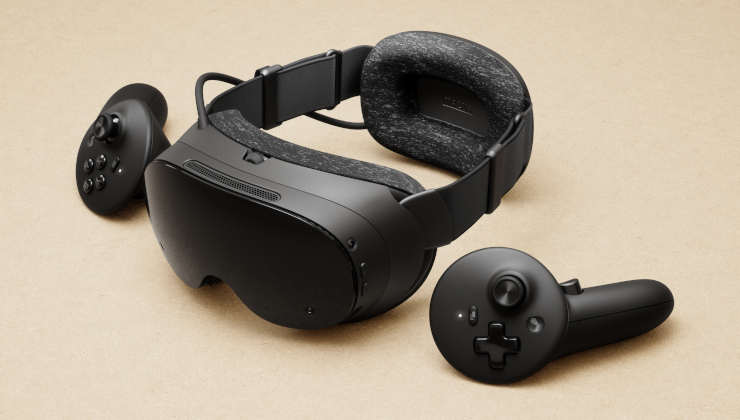There's always arguments across many angles on what exactly Linux needs to succeed to become more mainstream and the answer, as we've long said, is pretty simple.
Hardware. Pre-installed. That's it.
Honestly, it really is that simple. There's a fair bit of that now already with the likes of System76, Slimbook, TUXEDO , Star Labs and others I'm forgetting. However, none of those are particularly known outside of Linux circles (TUXEDO claim otherwise). Even if they're slowly pulling in newer non-Linuxy customers, they're still tiny and often expensive. Other vendors like Dell and Lenovo may have a few but they're often harder to find. It's a bit like the old Linux gaming loop — people don't want to switch due to "no games" and developers don't want to support directly due to "no users". Vendors don't often do it because they don't perceive there to be enough interest.
Writing in a fresh blog post titled "What desktop Linux needs to succeed in the mainstream", KDE developer Nate Graham agrees and I couldn't have put it better if I tried:
People get hung up a lot on features and usability, and these are important. But they’re means to an end and not good enough ends by themselves. Quality means nothing if people can’t get it. And people can’t get it without accessible distribution. High quality Linux distros aren’t enough; they need to be pre-installed on hardware products you can buy in mainstream retail stores! “The mainstream” buys products they can touch and hold; if you can’t find it in a mainstream store, it doesn’t exist.
Creating good distributions and good applications with good gaming support is only one small piece of the puzzle. We're not just talking about people going into stores to look at laptops and desktops to try them out though. The bigger known online stores and vendors, we need them to start stocking and properly advertising Linux systems too. Not just that though, the systems need to look good and work well for the vendors themselves, to also be interested in stocking them.
Graham believes that KDE continues to be in a good position to serve their needs too, noting the belief that hardware vendors look for these points:
- Flexibility. Your software has to be easily adaptable to whatever kind of device they have without tons of custom engineering they’ll be on the hook for supporting over the product’s lifecycle.
- Features that make their devices look good. Support for its physical hardware characteristics, good performance, a pleasant-looking user interface… reasons for people to buy it, basically.
- Stability. Can’t crash and dump users at a command line terminal prompt. Has to actually work. Can’t feel like a hobbyist science fair project.
- Usability that’s to be good enough to minimize support costs. When something goes wrong, “the mainstream” contacts their hardware vendor. Usability needs to be good enough so that this happens as infrequently as possible.
For KDE specifically all this is slowly coming together with more products going for KDE and Plasma like Valve with the Steam Deck, Pine with the PinePhone / PineBook Pro, the KDE Slimbook and the Kubuntu Focus. The point remains though - bigger mainstream vendors are essential.
The biggest push may indeed come from the Steam Deck. A PC in a handheld form factor, that allows you to hook it up to a monitor for a full KDE Plasma desktop experience. Very exciting. If we see a lot of people enjoy it and the Steam Deck is a success, you can be almost guaranteed that more devices will come along and slap SteamOS 3 on it and then also have a KDE Plasma desktop available. The knock-on effect could be seen elsewhere, with more people wanting to use KDE Plasma and then hopefully more vendors and we may even see a loop there with it finally being picked up more often.
The reason that just selling Linux pre-installs in mainstream stores both won't happen right away, and by itself wouldn't work is because people don't expect anything but Windows on machines they buy in these stores. To sell any Linux machines in mainstream stores (without them just being returned), you would have to make it clear that they were a different category than Windows machines. Then, without any previous demand, they just simply wouldn't sell at this point.
This is not to say that Linux could never succeed in mainstream stores, but it would have to be something that came about because of the demand gradually increasing. Significant demand can't be generated simply by making pre-installs more readily available.
The Raspberry Pi also contributes to a possible increase in demand for Linux machines. It occupies a category that Windows fails miserably at fulfilling, so in that category Linux thrives. As the people that use Raspberry Pis become more familiar with Linux in general, they might consider running it on a desktop class machine. Then they might even become interested in a Linux pre-install.
Of course the Steam Deck could help contribute to Linux popularity because it also can make people more familiar with Linux. The only issue here being that the Steam Deck experience will be largely 'console-ized.' That will mean that people don't really have to learn anything much about Linux to operate their Steam Decks. However, the availability of "desktop mode" with Plasma could lead some to becoming more familiar with Linux.
Desktop Linux popularity relative to itself has really grown by a lot over the past decade. If that continues, then eventually the amount that it increases will become a lot more significant in the overall desktop market. That's the nature of a geometric progression. Of course, there is no guarantee that it will continue, so there is no guarantee that Linux will ever be popular in the mainstream. However, it becoming popular in the mainstream is certainly still a possibility.
Last edited by CFWhitman on 14 Dec 2021 at 7:30 pm UTC
Quoting: vildravnEdit: The only problem with more vendors shipping with Linux as an alternative to Windows is that Microsoft is not just going to take it. Call me cynical but I am fairly sure there'd be kickbacks and incentives involved if that were the case.There have been before, so yeah.
I have a fundamental difference of, not just opinion, but interests, with those people. Quite simply, if they carry the day, it screws me over. They are computer tinkerers, I am a computer user. My interests are in a smooth desktop experience and a strong software ecosystem (including games). A strong software ecosystem cannot be maintained on ~1-2% desktop market share. It's amazing, and IMO a testament to the open source software development model, that we have as much and as good as we do. But at this level of market share we'll lag forever.
(On the smooth desktop experience, contrary to what you might imagine from some people saying the Linux desktop has to stay hard to use so only real men will use it or whatever, it's actually here already. I guess those people haven't tried Mint. So yeah, you're too late to preserve the tinkerer-only Linux clubhouse paradise, Linux itself is dead easy to use if you're using distros that are seriously intended to be easy to use and competently maintained to that end.)
Now the software ecosystem issue and market share brings me back to the article itself. Bottom line, Liam is right.
I've been saying the same thing for years. Sure, it's more complicated, there's kind of a chicken and egg with the software ecosystem. Like with games, it's hard to get games if you don't have market share and you can't get market share if you don't have games. The rest of the software is the same way. So sure, if, say, Dell just put Linux on all their desktop machines and did nothing else, uptake might be limited because there's a large subset of Windows users who want to use software that doesn't run, or doesn't run easily enough, on Linux.
But there is no escaping this situation without hardware sales and market share. And those are not impossible. For one thing, there's also a large subset of Windows users who don't have any needs that Linux software doesn't meet. With the right marketing you could sell to them. But ideally, what we need is a Valve outside of gaming--someone with objectives that Windows could get in the way of, someone with fears that Microsoft will muscle in on their racket or hold them for ransom at some point, and who will thus be willing to devote some resources to making Linux more viable in some portion of the desktop market, so they can put out the hardware and have people use it.
I think if the Steam Deck succeeds solidly it will make such plays more likely. It will directly increase the size of the Linux desktop-ish market, significantly increase Linux's visibility. But also the whole idea will seem much more plausible. After all, traditionally gaming was what Linux was worst at, so if a Linux gaming appliance is possible, what Linux desktop niche wouldn't be?
Last edited by Purple Library Guy on 14 Dec 2021 at 7:48 pm UTC
I made some very negative people happy with it, they were surprised that "Linux wasn't shit" when I was done. Their wifi even worked :-)
Soon after these Atom devices emerged, Microsoft brought Windows XP out of retirement and licensed it to netbook vendors, to combat them shipping with Linux. That soon changed to "starter editions" of Vista then Windows 7. They were both awful on that hardware.
Quoting: toorThe fact they were underpowered was actually probably the reason Linux was preinstalled instead of Windows Vista in the first place, because it made sense on a technical aspect. Yet people would rather buy those with Vista.I have Acer Aspire One, which is now collecting dust. I though about buying Asus EEE PC, but specs where annoyingly low. The thing is though that Aspire One had Linpus Linux and by default it booted into simple mode. For people used to Vista, it might have been bit of a shock. I actually quite quickly wiped the Linpus and installed Arch Linux.
EEE PC had Xandros, which might have been little bit better experience.
In the end those Linux netbooks might have been bit more popular with people who loved hacking them.
I need some explanation.
Linux is going to be more competitive than Windows - it sounds unrealistic.
Linux has been losing with Apple for the last 16 years. Linux can't even win with one Unix vendor. Really?
Apple has loyal users that aren't magically disappearing. They pay incredible money for the software and games for Mac.
You want to fight about first place on the podium, then first you should know how to win second place. That is the Apple position, and it's not going to be easy to win with them. It's about our wallets.
Quoting: gbudnyI don't understand it.Who we want to displace, how we want to gain share isn't so much about first, second, third place. Nobody wants to displace Apple or thinks it's plausible we would because of the way their particular schtick works, which is exactly the opposite of how Linux's particular schtick works. Apple's customers are loyal and specifically like the specific thing Apple are doing. They buy Apple because of Apple's strong brand, because they think it's cool, and because Apple does certain things very well that those customers want to do. They actively like that walled garden, which is after all very pretty. You're not going to dislodge that.
I need some explanation.
Linux is going to be more competitive than Windows - it sounds unrealistic.
Linux has been losing with Apple for the last 16 years. Linux can't even win with one Unix vendor. Really?
Apple has loyal users that aren't magically disappearing. They pay incredible money for the software and games for Mac.
You want to fight about first place on the podium, then first you should know how to win second place. That is the Apple position, and it's not going to be easy to win with them. It's about our wallets.
But most people who use Windows just use it because it's there. Half of them don't even know what it is. There's no brand loyalty there, it's this big shmoo of people who just "have computers". If they could "have computers" that did pretty much all the same stuff with maybe a bit less annoying nagware and stuff, they'd be fine with that, would in many cases barely notice the difference. That's easy to displace if you've got functionality and a sales channel. There's a ton of room to eat into Windows' market share selling to customers with no brand loyalty whose needs would arguably be served better by Linux. (What with software ecosystem issues, there are also plenty of Windows customers whose needs would not be served better by Linux, even though the OS itself is better)
Thing is, desktop Linux doesn't have a sales channel. And MS have historically gone to significant efforts to make sure it stayed that way.
Last edited by Purple Library Guy on 14 Dec 2021 at 10:53 pm UTC
Quoting: gbudnyI don't understand it.Speaking of UNIX, what's actually funny that Linux actually beat pretty much all the UNIX vendors, only one left with bit more significant presence is Apple. I think we are discussing about desktop though, server side is totally different market. Desktop users are not going to buy several computers without operating system and install then identical operating system in all of them.
I need some explanation.
Linux is going to be more competitive than Windows - it sounds unrealistic.
Linux has been losing with Apple for the last 16 years. Linux can't even win with one Unix vendor. Really?
Apple has loyal users that aren't magically disappearing. They pay incredible money for the software and games for Mac.
You want to fight about first place on the podium, then first you should know how to win second place. That is the Apple position, and it's not going to be easy to win with them. It's about our wallets.
Come think of it, desktop is one of the last markets where Linux isn't dominant.
The thing is though that Linux isn't Apple. It's ultimately up to vendors like Google with their Chromebooks and Valve with Steam Decks to make something that also non techies want to buy. Linux itself is not the problem as people buy quite lot of Android phones for example (Windows phones are not really a thing at the moment).
Quoting: GuestJust being preinstalled on machines is not enough. It needs to be preinstalled on the brands that people actually buy (Acer, Asus, HP etc), available in the stores people actually buy from (Argos, PC World, Currys etc) and priced comparatively or cheaper than the Windows variants.Problem is that this won't happen without a new "Canonical from 2004" coming from nowhere and greasing the wheels. Our problem with the big OEMs is that we cannot offer them anything, Microsoft gives them extremely cheap licenses so that they can sell their computers with a rebate, not to mention the amount of bloatware that they put on from Norton and Symantec for a real kickback.
As Nate says in his blog post, linux desktop marketing should be focused on hardware OEMs rather than end users.
Given the OEMs a free license to Mint and a free version of LibreOffice is not really giving the OEMs what they want :) hence why when they have sold Linux preinstalled, it has always been on their cheaper hardware as the budget choice.
Quoting: toorAlso, when people are forced to use Linux in some countries, like in Germany or in France for police or administration, the workers are usually not happy about it from what I heard, Linux was and still is built on a non-mainstream philosophy which is… tech passionate and open source.AFAIK those not happy workers only existed in a few places in the LiMUX project and it was way overblown by the Microsoft proponents, the switch back to Windows was political (the new Mayor promised to get Microsoft to move their German HQ to Munich, which they did) and was not due to any real objections by the workers.
Also, and I'm sure quite a few people will not like me saying this, but I think Linux will need to push Flatpak more if it wants to get into the mainstream. If we want more developers to develop/publish their applications on Linux, then I think Flatpak is the best method we have (for now, perhaps). Even Valve seems to be supporting this with their promotion of Flatpak as the primary means of installing applications on SteamOS 3.0.
Hardware. Pre-installed. That's it.It's that simple, I agree... Until it's not.
Mainstream? So business desktops? Home office? Media? Personal use? Gaming?
Can Linux support that? Sure it can. But it can't do it all at once. We can't claim it'll never work because of that. Baby steps.
I work in a Windows shop. My daily driver is a DOS program we SSH into (on a Linux server). We also use a lot of web forms and applications. Could we switch to Linux? Nope.
Some of our specialty programs we occasionally use are Windows only. I do some of our annual training. It's a 1Gb PowerPoint with embedded media, animations, everything made by a co-worker at work. It needs to be updated. Think that'll load on open office? (Spoiler: it crashes).
There's a reason why all the presentations I make for my work are PDF. I know it'll open. Where ever I take it.
I think Linux will be a great mainstream driver for home use, gaming, and maybe even some home office. We'll hit a wall once we get into more specialized operations. That's ok. We don't have to solve every hurdle at once.
And the only way to start is to offer competent hardware pre-installed.
Quoting: denyasisSome of our specialty programs we occasionally use are Windows only. I do some of our annual training. It's a 1Gb PowerPoint with embedded media, animations, everything made by a co-worker at work. It needs to be updated. Think that'll load on open office? (Spoiler: it crashes).I seriously do not understand why Linux can seamlessly run ridiculously complex Windows games with absurdly demanding graphics requirements, and can't run the latest Office or Adobe stuff. Like really, WTF? Why can't Wine do this?
Quoting: Purple Library GuyWINE can run the latest Microsoft Office. I run it through Crossover, though it's a bit dodgy and unstable. I was able to use it for half a year without any issues. The hardest part about getting Microsoft Office working, by the way, was finding the bloody download for it. It's impossible to find on any browser on GNU/Linux; I had to use a Windows computer using Microsoft Edge. That was the only way.Quoting: denyasisSome of our specialty programs we occasionally use are Windows only. I do some of our annual training. It's a 1Gb PowerPoint with embedded media, animations, everything made by a co-worker at work. It needs to be updated. Think that'll load on open office? (Spoiler: it crashes).I seriously do not understand why Linux can seamlessly run ridiculously complex Windows games with absurdly demanding graphics requirements, and can't run the latest Office or Adobe stuff. Like really, WTF? Why can't Wine do this?
As for Adobe, I know of people who use cracked versions of CS6 applications and before and vouch for the experience. The reason Adobe CC applications don't work isn't, as far as I know, because of some complex win32 libraries WINE has yet to implement properly; it's because of the DRM.
WINE doesn't have a position on "DRM", but as copy protection is more or less the same thing, this is what they have to say on the matter:
In an effort to make copy protection more effective (i.e. resistant to cracks), the methods used by many copy protection products have become complex, difficult to understand (obfuscated), and hard to debug. In some cases Wine would need to be altered to allow for almost rootkit-like functionality of programs to get some of these copy protection schemes to work. To support copy protection Wine developers have to contend with undocumented interfaces, code obfuscation, and maintaining compatibility with *nix security models.[Full article here.](https://wiki.winehq.org/Copy_Protection)
Wine cannot and will not break the functionality of these copy protection products. Wine's goal is to be compatible with Windows software, including copy protection. Although some would advocate the use of illegally modified or "cracked" games, Wine does not support, advocate, or even view this as a solution. The use of cracks is considered off topic on the forums, IRC channels, etc and will not be tolerated (summarily dismissed and deleted).
A lot of DRM doesn't work through WINE for these reasons.
The other reason, as I understand it, is because Vulkan offers most of the same featureset as Direct X > 12 and performant Direct X to Vulkan compatibility layers exist, that's most of the work already done. The most complex part of games is usually the graphics API calls. That's why a good portion of the remaining issues with games are codecs, anticheat, and DRM. Other software, like Adobe Creative Suite, depends on other core functionality that WINE hasn't implemented. I'm guessing this is why Affinity Creative Suite doesn't work through WINE...although it certainly could be the DRM as well.
Appealing to the masses always takes sacrifices, and I don't want that!
Quoting: GrimfistAhh, this whole topic is pointless in my humble opinion. I love and daily use Linux, I know how to use it, and that's about it. I don't need "The Linux Desktop" to succeed, it already succeeded for me, I can do all I want with my Linux machine (gaming, programming, Netflix & chill).I don't know about you, but I don't want GNU/Linux on the desktop becoming the Amiga of the operating system market; everyone thinks it's dead, but a choice few stragglers are hanging onto their way of computing for dear life.
Appealing to the masses always takes sacrifices, and I don't want that!
Perhaps Google moves on from supporting GNU/Linux and moves forward with their Zircon kernel and their own C library. While unlikely now, who knows what the future will hold? Why does this matter for you? Netflix, Amazon Prime, Hulu, and other platforms make use of Widevine DRM to protect their content. The only reason you're allowed to watch Netflix on GNU/Linux is by the grace of Google; they dropped support for 32-bit GNU/Linux systems earlier this year though maintain it for other, more popular operating systems. Regression is always possible.
If GNU/Linux is a shrinking niche, more software will become stale over time and proprietary software vendors will drop support for the platform.
For better or for worse, the only way to fight against this is constant progress...and part of that means catering to the needs of your target market. But that doesn't mean the Gentoos, the Arch Linuxes, and the NixOSes of the world will lose their way and start targeting different audiences. There's room enough for all of us here.
Last edited by pleasereadthemanual on 16 Dec 2021 at 11:23 am UTC











 How to setup OpenMW for modern Morrowind on Linux / SteamOS and Steam Deck
How to setup OpenMW for modern Morrowind on Linux / SteamOS and Steam Deck How to install Hollow Knight: Silksong mods on Linux, SteamOS and Steam Deck
How to install Hollow Knight: Silksong mods on Linux, SteamOS and Steam Deck